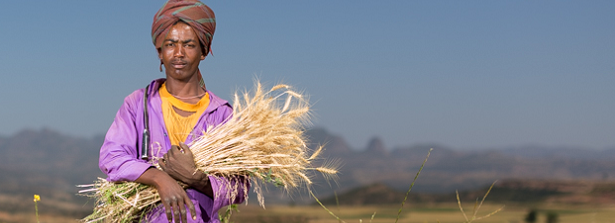Learning journey for Dutch Embassies through Ethiopia

For three days in October 2014, a group of 20 staff from nine Dutch embassies travelled through Ethiopia for a learning event. They reflected on Food & Nutrition Security (FNS) programmes in the countries they work in, shared experiences, and interacted with partners of the Embassy of the Kingdom of the Netherlands in Addis Ababa.
This cross-embassy learning event was an initiative of the Embassy Support Programme of the Ministry of Foreign Affairs (Food Security Cluster) and the Ministry of Economic Affairs, managed by Wageningen UR, CDI. Facilitation of the event was done by Simone van Vugt (CDI), Herman Snelder (MDF) and the Dutch embassy in Addis Ababa.
Central question during the trip was “What is needed to ensure that Dutch supported food and nutrition security programmes reach the impact they strive for?”. The question was broken down in four smaller areas of enquiry:
- Approaches to FNS programmes: In their portfolio participants saw three types of programmes: sector approaches; area-based approaches; and value chain approaches. They saw a trend towards more attention for sector and area-based programmes. But they also noticed a large overlap among these approaches, and realized that value chain approaches will remain important – embedded in sector and area-based approaches. Area-based approaches with embedded investment in market driven value chains can be a tool in enhancing stability in conflict-prone areas. Embassy participants of the journey exchanged experiences of the embassies of Ethiopia, Mali and Mozambique, and discussed implications for steering and monitoring these programmes.
- Scaling in FNS programmes: Furthermore, the contributors to the trip observed in their portfolio various practices and assumptions about how good practices are scaled up (transforming the enabling system) or out (expanding to other areas). Examples of Kenya, Mali, Rwanda and Ethiopia were shared, highlighting the importance of market-driven mechanisms and of connecting local level evidence of agricultural innovations to national policy level.
- Aid and Trade agenda: In their portfolio a growing amount of experience in combining aid and trade was remarked. Examples from Benin, Ethiopia and the Palestinian Territories were discussed. In all countries the attention for the ‘missing middle’ between smallholders and commercial farms was considered vital for inclusive trade programmes. Important lessons were exchanged from the rose farm coining the concept of Trade for Aid to what embassies can do with relevant authorities to improve the business climate (“Traid”).
- Result frameworks and reporting: The Ministry is still fine tuning the frameworks for reporting on FNS. Related questions were discussed, such as: “Can we capture our results in the current result fiches?”, “Does the current framework stimulate learning, or is it mainly for accountability?”, Where do Theories of Change (ToC) fit in our programmes? Reflections from the Great Lakes, Bangladesh, Uganda and IOB helped to identify steps forward towards a coherent framework for accountability to society, fearless results reporting, thematic steering, ToC and institutional learning.
All this came from a three-day “Magical Mystery Tour” in a touring car along visiting best practices in Ethiopia. The 20 participants visited a seed cooperative supported by Integrated Seed Sector Development (ISSD), that works with a sector-wide inclusive approach that builds seed programmes upon a diversity of seed systems, an strengthens seed sector governance. They also visited CASCAPE, a multidisciplinary programme reaching over 18.000 farmers, focusing on innovating agricultural practices and bringing these new practices to scale. Finally, the embassy staff members visited AQ Roses in Ziway, where they saw how a Dutch floriculture entrepreneur is making a major contribution to economic development by creating over 1200 jobs, and runs a profitable business.
There were discussions with those partners on the type of support they need and expect from the Dutch embassy. Participants tried to understand what is needed to better capture the results and the lessons learned within the Dutch FNS programmes with its partners, and how to communicate these results and lessons to the general public and parliament.
The key insights in the four mentioned areas have been documented in a collaborative process for internal learning.
Report written by Herman Brouwer (Wageningen UR, CDI) and Wijnand van IJssel (Ministry of Foreign Affairs).
EKN Learning Journey – Ethiopia 2014; Key Insights Series
Three brochures (PDF) containing insights developed by a group of staff from nine Dutch embassies and The Hague, travelling in a bus through Ethiopia in October 2014. They reflected on Food & Nutrition Security programmes in their countries, shared experiences, and interacted with partners of EKN Addis Ababa.
#1 – On Approaches for Food & Nutrition Security Programmes
What can we learn from different approaches that Embassies use to achieve food security results?
#2 – On Scaling up of FNS Programmes
What do we know about the mechanisms and incentives for bringing good practice to scale?
#3 – On Aid & Trade in FNS Programmes
What are we learning in practice about Aid and Trade agenda?





